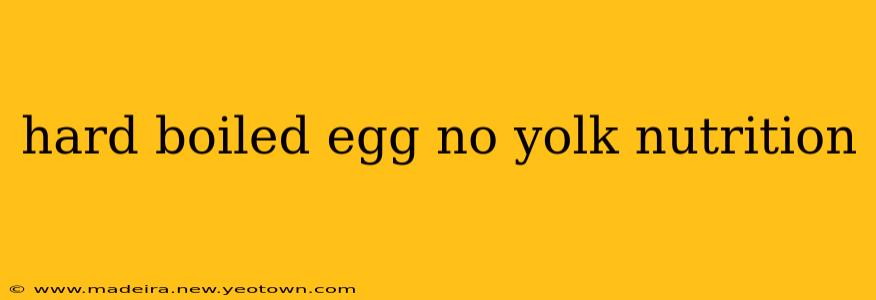Let's be honest, sometimes you just crave that satisfying protein punch of a hard-boiled egg, but you're watching your cholesterol or simply prefer the taste and texture of just the egg white. This isn't some bizarre dietary fad; many people find the firm, slightly chewy texture of the egg white a delicious and convenient source of protein. So, what's the nutritional breakdown of a hard-boiled egg without the yolk? Let's dive in!
What are the nutritional benefits of eating only egg whites?
This is a common question, and the answer is multifaceted. Egg whites are practically a powerhouse of pure protein. They’re incredibly low in fat and carbohydrates, making them a popular choice for those following low-carb or ketogenic diets. The protein in egg whites is also considered high-quality, meaning it contains all nine essential amino acids your body needs but can't produce on its own. These amino acids are crucial for building and repairing tissues, supporting immune function, and countless other bodily processes.
How many calories are in a hard-boiled egg white?
A single large egg white typically contains around 17 calories. This makes them an incredibly light and satisfying snack, or a perfect addition to a larger meal without significantly impacting your daily calorie intake. Remember, calorie counts can vary slightly depending on the size of the egg.
Are there any downsides to eating only egg whites?
While egg whites are undeniably healthy, exclusively consuming them means missing out on the vital nutrients found in the yolk. The yolk is packed with vitamins like A, D, E, and K, as well as choline, an essential nutrient for brain health and liver function. Iron and other minerals are also concentrated in the yolk. So, while a hard-boiled egg white is a great addition to a balanced diet, relying solely on them can lead to nutritional deficiencies over time. Moderation and variety are key.
Is it okay to eat only egg whites if I am trying to lose weight?
Egg whites can certainly be a helpful part of a weight-loss strategy. Their high protein content promotes satiety, keeping you feeling fuller for longer and reducing the likelihood of overeating. The low calorie count further contributes to a calorie deficit, which is essential for weight loss. However, remember that a balanced diet is still crucial for overall health and sustainable weight management. Don't neglect other essential nutrients found in whole foods.
What are some creative ways to eat egg whites?
You don't have to simply eat plain egg whites! Get creative! They can be whisked into omelets (with or without vegetables), added to smoothies for a protein boost, or used as a binding agent in recipes like meatballs. They’re incredibly versatile and can seamlessly integrate into various meals and snacks.
Are there any risks associated with eating only egg whites?
The main risk is nutrient deficiency if you consistently exclude the yolk. As mentioned earlier, the yolk contains vital vitamins and minerals. While a single egg white is unlikely to cause problems, a long-term diet consisting solely of egg whites could potentially lead to deficiencies in vitamins A, D, E, K, choline, and other important nutrients.
Conclusion:
Hard-boiled egg whites offer a lean, protein-packed snack perfect for those watching their calorie or fat intake. However, remember to incorporate the whole egg occasionally to reap the full range of nutritional benefits. Balance is key to a healthy and sustainable diet. Don't let the fear of the yolk prevent you from enjoying all the amazing benefits a whole egg offers!

